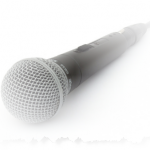The Podfading Roller Coaster

Podfading is a term used to describe podcasters who start regular podcasting shows, but then fade away -- either quickly or gradually. Podfading is a regular theme in the podcasting world.
For example, Benjamin Grundy of the Mysterious Universe podcast recently went into "deep space hibernation." Brian Oberkirch used to podcast, but hasn't published a new podcast for months. Even the host of the WordPress Podcast, Charles Stricklin, who has a large following and an abundance of material, at times finds it difficult to publish podcasts every week.
In Tricks of Podcasting Masters, Walch and Lafferty list five reasons for podfading:
- Lack of time
- Lack of interest
- Lack of material
- Lack of listeners
- Lack of funds
Lack of time is the most common reason. Yet "time" is always relative. Here is how one podfader, Catlas of the now defunct Catlas Podhead Podcast, explains her lack of time:
I guess I just burned out. I took on too much too fast, and it became work instead of fun. I have recently taken up bicycle riding with a local cycle club, and we ride about 100 miles a week. I have also been triathlon training. I am a huge outdoor fan, and when summer rolls around I do not spend much time inside on the PC. I guess I never realized how much computer fun is a winter sport for me. (p.35)
She doesn't have enough time to podcast because she's biking 100 miles a week. Catlas really should have said, "I felt more value in biking than podcasting, and I changed how I spent my time.
After last year's Doc Train West conference, I started to podfade. I burned out after publishing a dozen interviews from people I met at the conference. When I hit the Publish button on the last interview, I decided that I was done with podcasting. I didn't interview anyone at the STC Summit, even though I had plans to. And then I didn't podcast for the next three months.
I justified my podfading with a similar argument as Catlas, only instead of biking 100 miles a week (which would have been awesome), I decided to write more. As my blog title suggests, I'd rather be writing. I wanted to focus on my strengths. Do few things but do them well. And so it went.
At the very least, I decided to take a long break from podcasting. This is exactly what Tee Morris recommends to avoid podcasting burnout. In Expert Podcasting Practices for Dummies, Tee suggests that, to avoid podfading, you should
Make a clean break and step away from [podcasting] completely. Stopping a passion cold-turkey can actually shock you back into a renewed love for what you talk about.
When you do something for nothing, it should be something you look forward to doing. …. If you don't love what you do, the podcast becomes a chore – and there's very little you can do to mask that ennui in your delivery when the mic goes live.
Step away from the mic and take a sabbatical. When you're ready, make the return with a new-found fire and heavy fanfare. Not only will your loyal fans return, but you might even catch a few new listeners, too." (393)
So I took a podcasting sabbatical without guilt. In the fall, feeling somewhat mixed about not podcasting, I recorded a few shows, but off and on, averaging about one or two a month. Not many complained about the absence, nor did they herald the return. The lack of response only propelled my apathy.
My driving routine changed, and I no longer had the regular feast of podcasts to energize me while commuting to work. Still, I managed to squeeze a podcast in every now and then. We have some buildings on our work campus that are about a mile apart from each other. When walking between the two, it's a perfect time to listen to podcasts.
Last week, while walking between these buildings and listening to one of Alistair Christie's podcasts, it hit me -- my purpose with podcasting. Listening to Alistair and Graham, I felt personally connected to them more than any other blog I read. I realized that podcasting, more than almost any other communication medium, has a power to make you feel close to the podcaster, closer than you might feel to a novelist or blogger you've been reading. Realizing this, I knew that I couldn't let go of podcasting. Audio has too much potential to dismiss.
Podcasting does take time. And in a world of competing interests, expanding opportunities, and growing commitments, I may one day say, No more. But for now I will try to move with the flow of my life and adapt.
I've avoided burnout long ago by relying on the interview format to generate content rather than creating all the content myself. Also, I recently altered my recording process to both increase the quality of the audio while simultaneously reducing the post-processing time. As long as I can maintain enthusiasm for the format -- by constantly listening to podcasts, trying new techniques, having engaging conversations with people all over the world -- I think I can keep the podfading reaper away.
Additional Resources
- "Podfading Takes Its Toll" by Steve Freiss


